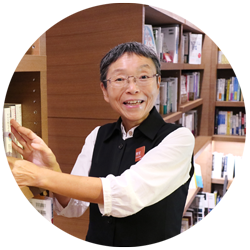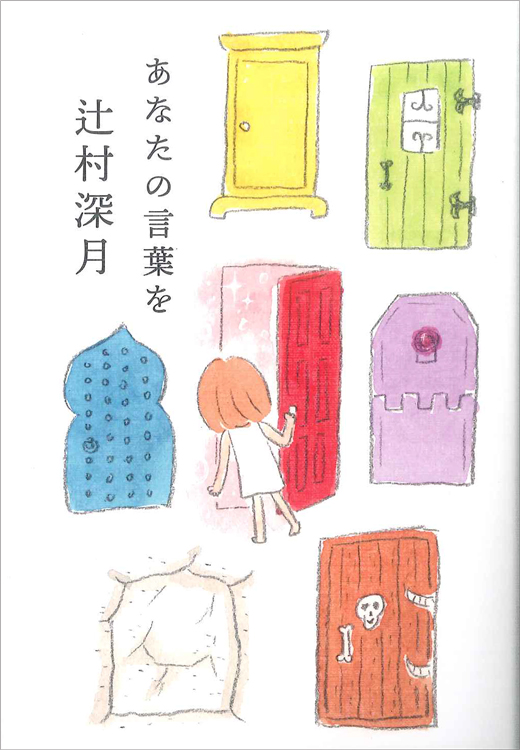[No. 269] Michiko Mamuro's Bookshelf "Your Words" by Mizuki Tsujimura / Mainichi Shimbun Publications
Known as the "original charismatic bookseller," DAIKANYAMA TSUTAYA BOOKS, who recommends books in a variety of media including magazines and TV.
In this series, we take a peek into the "bookshelves" in the mind of our most popular concierge.
Please enjoy it along with his comments.
* * * * * * * *
"Your words."
Tsujimura Mizuki / Mainichi Shimbun Publications
Click on the image to go to the purchase page.
Click on the image to go to the purchase page.
* * * * * * * *
Before writing about Tsujimura Mizuki's book, I would like to introduce a radio program featuring Audrey's Wakabayashi Masayasu.
Wakabayashi has a two-and-a-half-year-old daughter, and on a day when his wife was away and it was just father and daughter, she said she wanted to play hide-and-seek. Then, she said something shocking: "Let's hide together."
What will happen? While thinking this, he was led by his smiling daughter and together they crawled under the desk. Time passed. Of course, no one came looking for them. After a while, the daughter looked into her father's eyes and asked, "Are you ready?" What will they do?!
I decided that at least now it wasn't "enough" so I said "Not yet". It seemed to be the reaction she wanted and the daughter seemed satisfied. Then, the daughter "enough" and father "not yet" went on for about three turns, and then the hide-and-seek game ended in an unexpected way.
There were two things that Wakabayashi thought were interesting.
First of all, my daughter goes to nursery school. If I suggest to her friends at the nursery school that they both hide in a game of hide-and-seek, she might say, "That child is weird." Should I tell her that what she did today was not actually the correct way to play?
Meanwhile, Wakabayashi wonders what the appeal of hide-and-seek was. "Hiding in a special place by myself" and "cuddling up together in the same place as the girl I like." The latter was more fun, he recalls.
So, the second thing is, "Hmmmm." As the unusual game of hide-and-seek continued at home, Wakabayashi had something he wanted to suggest to his daughter. So, one day, he said, "Let's look for it together."
What do you think happened, everyone? If you're interested, check out the All Night Nippon broadcast on March 16, 2024 on YouTube!
By the way, this book by Tsujimura is a compilation of the serial articles that appeared in the Mainichi Elementary School Newspaper, and most people would think that it is about empathizing with the various doubts and feelings of suffocation that children feel, and saying, "I felt the same way when I was a child, and now that I'm an adult, I think this way." Not true. The highlight of the book is Tsujimura's "sense of continuity."
As stated in the "Introduction," Tsujimura-san has lived her adult life with the feelings she had as a young girl still inside her. It's not just that she "hasn't forgotten." As you read, you come across moments when you think that the "adult Tsujimura-san" has been pushed aside and the "child Tsujimura-san" has emerged.
For example, I still have a feeling of discomfort when I hear the words, "You are a hard worker." During the COVID-19 school closures, I was asked to talk about the importance of reading, and while I gladly accepted the requests, I wanted to ask the clients, "Why do you think reading is important?"
These sparks of emotion run between the lines. They are not "childish" or "traumatizing." They are genuine regrets that make people move forward. I think that more than children, they can only be understood by "adults who still have a child in them."
Now, in this book, there are episodes that will make you wonder, like the one mentioned above by Wakabayashi, "What does that mean?"
Tsujimura has a son in the third grade of elementary school and a daughter who is five years old. At the end of the year, when she was sorting through photos, her daughter saw a photo of her eldest son when he was about one year old and asked, "Is this a photo of you when you were a little sister?"
So how did the phrase "Big Brother is Little Sister" come about? Tsujimura's reasoning is brilliant!
What I thought was that "adults are tested by children." It's not that they do something to them, but that children, just by being alive, give us difficult and strange questions that shake our very existence. It's not a case of "correcting it and that's the end of it" or "just telling them the right answer and it's OK." As long as adults are alive, they have to respond to it. Not as a duty or a pain, but as a joy.
Both Wakabayashi and Tsujimura are "people of words." The cover says, "For those who will soon become adults," but this is a book I would also recommend to those who were once children.
Wakabayashi has a two-and-a-half-year-old daughter, and on a day when his wife was away and it was just father and daughter, she said she wanted to play hide-and-seek. Then, she said something shocking: "Let's hide together."
What will happen? While thinking this, he was led by his smiling daughter and together they crawled under the desk. Time passed. Of course, no one came looking for them. After a while, the daughter looked into her father's eyes and asked, "Are you ready?" What will they do?!
I decided that at least now it wasn't "enough" so I said "Not yet". It seemed to be the reaction she wanted and the daughter seemed satisfied. Then, the daughter "enough" and father "not yet" went on for about three turns, and then the hide-and-seek game ended in an unexpected way.
There were two things that Wakabayashi thought were interesting.
First of all, my daughter goes to nursery school. If I suggest to her friends at the nursery school that they both hide in a game of hide-and-seek, she might say, "That child is weird." Should I tell her that what she did today was not actually the correct way to play?
Meanwhile, Wakabayashi wonders what the appeal of hide-and-seek was. "Hiding in a special place by myself" and "cuddling up together in the same place as the girl I like." The latter was more fun, he recalls.
So, the second thing is, "Hmmmm." As the unusual game of hide-and-seek continued at home, Wakabayashi had something he wanted to suggest to his daughter. So, one day, he said, "Let's look for it together."
What do you think happened, everyone? If you're interested, check out the All Night Nippon broadcast on March 16, 2024 on YouTube!
By the way, this book by Tsujimura is a compilation of the serial articles that appeared in the Mainichi Elementary School Newspaper, and most people would think that it is about empathizing with the various doubts and feelings of suffocation that children feel, and saying, "I felt the same way when I was a child, and now that I'm an adult, I think this way." Not true. The highlight of the book is Tsujimura's "sense of continuity."
As stated in the "Introduction," Tsujimura-san has lived her adult life with the feelings she had as a young girl still inside her. It's not just that she "hasn't forgotten." As you read, you come across moments when you think that the "adult Tsujimura-san" has been pushed aside and the "child Tsujimura-san" has emerged.
For example, I still have a feeling of discomfort when I hear the words, "You are a hard worker." During the COVID-19 school closures, I was asked to talk about the importance of reading, and while I gladly accepted the requests, I wanted to ask the clients, "Why do you think reading is important?"
These sparks of emotion run between the lines. They are not "childish" or "traumatizing." They are genuine regrets that make people move forward. I think that more than children, they can only be understood by "adults who still have a child in them."
Now, in this book, there are episodes that will make you wonder, like the one mentioned above by Wakabayashi, "What does that mean?"
Tsujimura has a son in the third grade of elementary school and a daughter who is five years old. At the end of the year, when she was sorting through photos, her daughter saw a photo of her eldest son when he was about one year old and asked, "Is this a photo of you when you were a little sister?"
So how did the phrase "Big Brother is Little Sister" come about? Tsujimura's reasoning is brilliant!
What I thought was that "adults are tested by children." It's not that they do something to them, but that children, just by being alive, give us difficult and strange questions that shake our very existence. It's not a case of "correcting it and that's the end of it" or "just telling them the right answer and it's OK." As long as adults are alive, they have to respond to it. Not as a duty or a pain, but as a joy.
Both Wakabayashi and Tsujimura are "people of words." The cover says, "For those who will soon become adults," but this is a book I would also recommend to those who were once children.
* * * * * * * *
(Redirects to Yahoo! Shopping)

DAIKANYAMA TSUTAYA BOOKS Literature Concierge
Michiko Mamuro
【profile】
"The original charismatic bookseller" who recommends books in various media such as magazines and TV. Has serials in magazines such as Fujingaho and Precious. Active as a book critic, her paperback reviews include "The Pale Horse" (Agatha Christie/Hayakawa Christie Bunko), "Motherhood" (Minato Kanae/Shincho Bunko), "The Snake Moon" (Sakuragi Shino/Futaba Bunko), and "Staph" (Michio Shusuke/Bunshun Bunko).
























